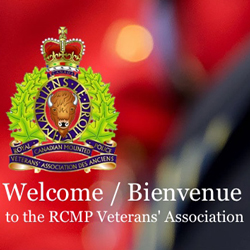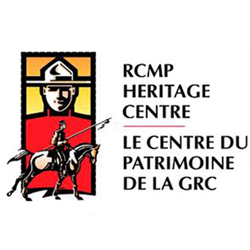Ric Hall’s Reflection Back In Time
Ric Hall explores the old Reports of the North West Mounted Police and discovers some interesting historical perspectives. We have included some of Ric’s discoveries in this webpage.
More skimming through some of the Commissioner’s annual reports from 1874-1886….not much has changed, transpose horses for cars, kit and clothing issues, accommodations, dealing with Indians, opposed to “peaceful protesters” and the list goes on!

Photograph of North West Mounted Police Commissioner Lawrence Herchmer (O.72) (Source of photo – RCMP Gravesite database).
Commissioner Herchmer’s Annual Report for 1886 comments on
“All the force have now been supplied with Enfield revolvers, which are is eminently adapted for our use, and all have Winchester carbines. This weapon appears to be well suited to our requirement, but needs a good many improvements, deficiencies existing in the sighting of many of these carbines, and they are too weak in the stock.” It seems that issue of how to carry the carbine on horseback still persists! ” The present system of carrying the carbine on the horn of the saddle, while perfectly suitable for patrolling, is not adapted for close ranks, several plans are now on trial.“
“During the last year it was deemed expedient to increase the Force in a very limited period, from 500 to 1,000 men and consequently many men were admitted who were neither suited by character or ability to perform the onerous and responsible duties of their new positions. It has since been found necessary to invalid some of these men who were passed by medical examiners in eastern Canada; and a good many others were men accustomed to lead idle lives around towns, this class finding that the discipline enforced prevented them from following their natural inclinations, have, in many cases deserted; and, owing to the great facilities furnished by the enormous extent of the country, have in many instances, have effected their escape, but many have been recaptured; and the majority, after undergoing their imprisonment, have turned out very well indeed.
The men we want are farmers’ sons, with good common school educations, and a proportion of the better class on discharged short service men from the Imperial service. Of these two classes our best men are generally composed, although, we have a number of young good family and education, many of whom after short service, in which they get accustomed to the work, are all that can be desired; but it is the farmers’ sons raised in the Dominion, that I should like to look for the majority of our recruits; this class of recruits all understand the care of horses, and are accustomed to hard outdoor work, to the climate and to taking care of themselves in any situation, but, unfortunately, the short term of five years does not permit us to keep these trained men a sufficient time in the service; the best and smartest generally, after one period decline to reengage, as there is nothing to look forward to…….This can only be remedied by a system of pensions, which if carefully administered, would retain in the force a large percentage of our best men, whose example would be everything to our recruits. Such a system, I had the honor to submit to your consideration and the trifling expense incurred would be many times over repaid in the efficiency of the Force, which only requires the prospects of such reward for long and meritorious service to secure and retain the services of the best men in the Dominion.”
Physique of Force: “The physique of the force is very fine and improving all the time, the trouble being to get clothing large enough; but now that our clothing is generally made in Canada with proper size rolls there should be no difficulty in guarding against this mistake.”
Desertions – “Most of the desertions during the past year were men who had not completed a year’s service, many of them but a few months, and, with very few exceptions, were men of wandering disposition, who would not be content in any sphere of life. As a rule desertions take place during the first year of service, and the seeming large number during the past year is due to the late hurried increase in the strength of the Force, when many men of a class were engaged who, otherwise, would not have been accepted.”
General State of Force: – “It has been my aim, since my appointment, to keep the Divisions in the west in every way ready for any emergency that may arise. All the Divisions are now well horsed, armed and equipped, and each is at its full strength, and generally all ranks are well up in their work; and if unfortunately they are called upon at any time to face the Indians, I have no doubt they will be found quite equal to the occasion.”
Commissioner Herchmer’s Annual Report of 1887:
Indians – The conduct of the Indians throughout the Territories during the past year has been remarkably good, those in the North and East having generally stayed at home and worked their farms with the most gratifying results. Early in the spring Bloods caused a good deal of trouble. A number of their young, men, tired of the reserve , and anxious to distinguish themselves , made a dash on Medicine Hat and vicinity and on U.S. territory , stealing a number of horses. During the summer too we had occasional trouble with them. Occasionally cattle have been killed in the neighbourhood of their reserves, but arrest, speedy trial and punishment of “Good Rider,” a Blood, stopped this practice.

Photograph of an unknown North West Mounted Police member in conversation with an aboriginal man (Source of photo – Doug Madill).
The Piegans and Sarcees have given no trouble, with the exception of a few cases of breaking into houses in the vicinity of their reserves. The rapid settlement of the country in the vicinity of these tribes, and the system of allowing the Indians off their reserves, practically when they please, together with their being permitted to carry arms (mostly of the repeating pattern) is liable sooner or later to result in serious trouble, involving not only the cattle business in the West, but the settlers.
The police have been frequently blamed for not displaying their old firmness and dash when dealing with criminal Indians, but it must be remembered in the old days the Indians could only retaliate on the Police themselves, and on a few traders, quite able and only too ready to care of themselves. Now-a-days the people are scattered all over the country, and rashness on part of the Police might at any time result in the murder and insult of settlers and their families. There is no deficiency of pluck in the Force I have to the honour to command, and when necessary and advisable, I have no doubt the same dash will be found as formerly.

Photograph of two RNWMP members sitting in a liquor establishment in Dawson City (Source of photo – Doug Madill).
Conduct, Discipline, etc. – “The conduct of the men in the force has generally been very good indeed during the last year. Nearly every instance of bad conduct has been directly attributable to whisky, and I have found it necessary to summarily dismiss several men. I propose in the future with your consent to dismiss all men with dissolute habits as they are only an encumbrance to the force.”
“The energy and good conduct of the non-commissioned officers throughout the forces has been a bright example to the mean, and I am happy to say that I have no cause to regret any promotions that I have made during the year.”
“A great deal has been written in the newspapers about dissatisfaction among the men, caused by bad management and favortism for Old Countrymen when making promotions. This is not the case as the men are generally well satisfied, strict impartiality having been invariably shown in promotions. Being a Canadian myself of United Empire Loyalist stock, it is hardly likely that I should pass over Canadians, in fact the records of the force in your possession clearly show that there are more Canadian non-commissioned officers in proportion to the number of Canadians in the force than is the case of other nationalities.”
Reengagement – “Many others would re-engage if there was no objection to married men, but the difficulty of providing married quarters and many other reasons, render the engagement of married constables undesirable.” This brings rise to the old line, used for many years…if the RCMP had wanted you to have a wife…they would have issued you one!
Physique – “The general physique of the force is of a very high standard, and there are very few men who are not in the prime of life, they are well set up and generally fit for the arduous work they are liable at any time to be called upon to perform.”
Desertions – ” Most of the deserters were as usual of very short service and were generally town-bred men who were not suited to the lonely life incidental to a policeman’s duty in this country. Greater care is necessary in selecting recruits for this force. Many of the certificates on which men were engaged are written by friends who are anxious to them out of their neighbourhood, and hope that the discipline of the police will reclaim their protegees. “
If you have any comments that you would like to forward on to Ric about any details above, please feel free to email him at rshall69@shaw.ca.


 November 25, 2014
November 25, 2014 









